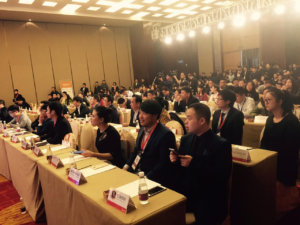Live from Shanghai: “The only way ahead is Chinese media, Chinese presence and Chinese banking. All other channels will not work”
Gone are the days of small to medium brokerages attracting business from mainland China. The only way in 2017 is to have full Chinese operational presence. This applies to brokerage facilities, use of media, hosting and payments.

The complex conundrum which blighted the boardrooms of many retail FX brokerages as far back as ten years ago with regard to how to ensure a good and sustainable method of doing business with what was then regarded as a massive and untapped land of opportunity in the Far East has largely subsided, and many small to medium sized retail FX brokerages have made at least some inroads via relationships with introducing brokers.
Acquiesence and resting on one’s laurels, however, is never the path to long term business strength, especially when the electronic trading industry is now subject to rapid development cycles due to its highly technologically advanced nature, and its necessity to adapt quickly to new circumstances, whether regulatory or commercial.
Nowadays, gone are the small IB channels which involve a representative with a relationship with local traders sending their funds to an overseas brokerage.
Today’s Chinese retail FX trader is astute, often extremely well-heeled, and in many cases, especially in second tier development towns such as Shenzhen and Zhengzhou, has multi-million dollar commercial real estate ventures and vast derivatives portfolios being funded by the monthly profit from lease agreements on vast illiquid assets such as mutli-storey apartment towers or shopping and leisure complexes.
Here today in Shanghai, China, YOCA, in conjunction with FinanceFeeds, is hosting its annual FX industry conference, which began this morning with a panel discussion that focused on how media channels are now used in order to most effectively engage retail traders in mainland China.

Moderated by FXWord’s global CEO, a highly interesting and very important point was made during the hour long discussion, that being the change in the way brokerages are going to have to utilize media channels in the year ahead in order to maximize their efficiency, as no longer is the entire environment similar to the inaugural years of the end of the last decade.
Media, whether televised or internet based, online or offline, is a major tour de force in China. Companies that have succeeded in this sector within the mainland have often poured marketing budgets into mainstream television advertisements, billboard posters, radio and internet campaigns.
This stresses the importance of being inside China, and not on the outside.
China may well indeed be a land of opportunity, however its internet is domestic, its payment solutions systems and banking infrastructure is domestic, and the entire environment in which the country which powers the entire world’s industrial, commercial, intellectual and financial world is impenetrable to the outside world, and vice versa.
This has made China, in the eyes of western brokerages, relatively akin to an oasis in a huge desert which, after massive effort has been made without resources to approach it, turns out to be a mirage.
As a result, many brokerages which have managed to forge some relationship with Chinese IBs or via media campaigns that have been small enough to not be of consequence to the all-seeing eye that is the Chinese firewall, have rested on their laurels and let this continue.
Until now…
Last week, SAFE, the Chinese FX industry regulator, which is owned by the People’s Bank of China, which in turn is owned by the Chinese government, made new rulings that any customer wishing to transfer money abroad to a non-Chinese individual or business, will have to declare what the funds are for, and if they are for derivatives or securities trading, they will not be transferred, as this is one of the categories that the Chinese government has banned for transferring funds abroad.

Thus, for small brokerages with no presence in China, that is the end of their ability to operate omnibus accounts with all-important IBs, and it is also the end of the ROI (return on investment) for any media having been purchased on Chinese sites by such firms, as they will be unable to attract an audience that can transfer their funds into a trading account overseas.
FinanceFeeds CEO Andrew Saks-McLeod took the conversation in this direction this morning here in Shanghai, stating “For brokerages, technology providers and integration firms that make up the entire infrastructural architecture of the retail trading environment, only those with actual presence in mainland China, with physical offices, hosting, and a Chinese website based in China which is connected to Chinese payment facilities and has partial Chinese ownership or a joint venture agreement in place will be able to conduct their business with Chinese retail customers and IBs in future.”
As the only non-Chinese executive here today, FinanceFeeds interaction with the audience was expertly translated by Aki, who is a Senior Marketing Associate at Leverate’s Shanghai operations, the panel discussion was held entirely in Mandarin Chinese, as absolutely no English is spoken or written among Chinese officials, so domestic is its audience and entire business structure. Quite simply, China is such a powerhouse and such an economy in its own right, that it does not need to rely on any form of outside influences.
“We are speaking today about the new ways that media in China will have to be used in order to attract and maintain a sustainable client base as well as organically grow any business, and from my research, the only method now is to concentrate on media campaigns that are based in China, originate from Chinese entities – meaning Chinese hosted and partially owned subsidiaries of Western brokerages or technology firms, and not to make any media campaigns that focus on China, from outside China” – Andrew Saks-McLeod, CEO, FinanceFeeds
“The reason for this is that nowadays, with large introducing brokers in regional towns and cities that are highly astute and operate offices with in some cases over 100 staff and perform every possible activity that a retail brokerage itself would perform including portfolio management via MAM accounts with in house money managers, full payment and withdrawal services, back office and customer relations departments and a customer-facing sales team, the Chinese retail trader is today more empowered than ever, yet totally focused on the relationships with large IBs” said Andrew Saks-McLeod to the audience, which consisted of over 250 executives from mainland China, all representing Chinese and international FX companies.
“There is no point at all in purchasing football sponsorship, or buying media remotely from outside China, as not only has this been severely restricted by Baidu’s advertising clampdown on OTC derivatives firms from abroad, but the high costs and difficulties in knowing where to position such media will be further thwarted by the inability for the increasingly small number of clients that would click on such an advertisemnt rather than deal directly with their existing firm to send their funds overseas.”

“Thus, in today’s world, the only means of using the media correctly is to do as companies that have already taken the steps of founding joint ventures or have opened Chinese offices, such as FXCM, Saxo Bank, Blackwell Global and BMFN, and on the institutional side, Advanced Markets and Sucden Financial (HK) Ltd.
These companies are hosted locally and have become vast household names across mainland China, and are free to be able to use local and national Chinese media channels to attract and maintain a relevent audience without restriction on conversion via advertising or transfer of capital to trading accounts” said Andrew Saks-McLeod.
Joining FinanceFeeds in this morning’s panel was a senior executive from Chinese cross-platform mobile messaging firm WeChat, which is very similar to WhatsApp in its functionality, however is for the domestic Chinese audience.
WeChat has become a vital tool in use among all introducing brokers. FinanceFeeds has met with introducing brokers across the country which have portfolios of over $250 million onder management, all of whom use WeChat as the main source of media as well as connection with their customers. Today’s discussion highlighted that introducing brokers are reliant on developing massive WeChat networks, regardless of size or amount of assets under management.
This, in itself is another indicator that having presence in China in terms of full operational capacity is the only way ahead.
No longer are there any more dialogues about Western firms buying institutional providers in China as had been the case last year. Instead, Western brokerages are focusing on increasingly basing their operations in Mainland China, which is absolutely evident in the retail companies here at today’s conference.
Over half of the companies, including AxiTrader, Leverate, VantageFX, GMI, GKFX, eToro, and Gold-i, that are here today are Western, however their presence in Shanghai and corporate structure here is completely Chinese and as a result completely aligned and sustainable.









